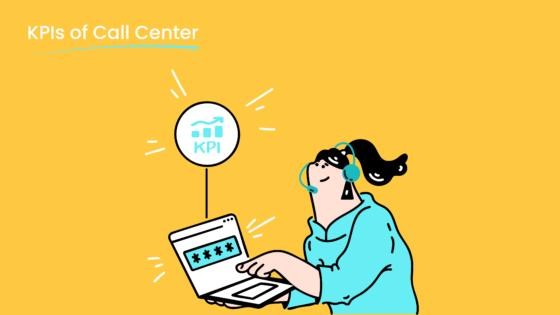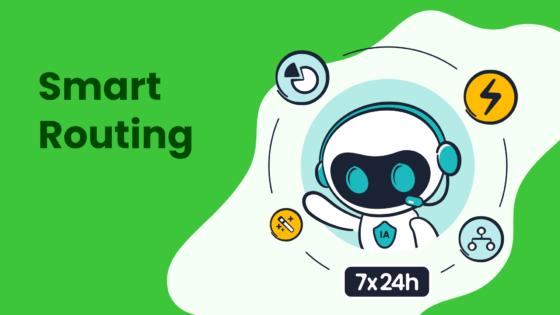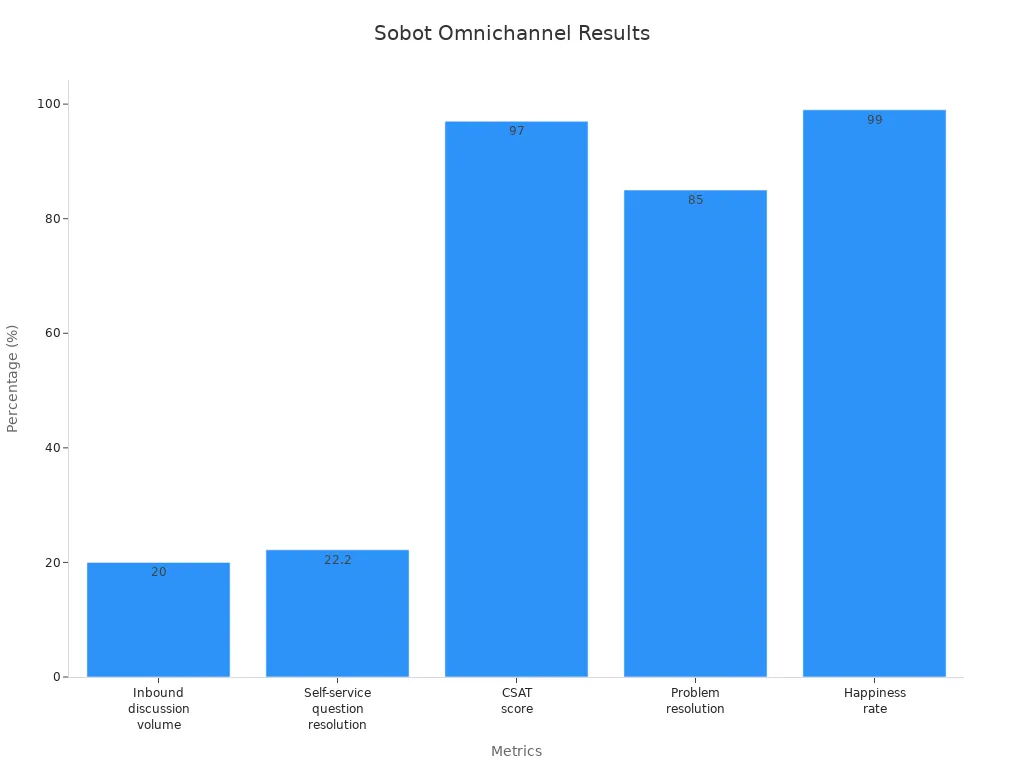How Hard and Soft Skills Shape Service Success

In customer service, hard skills and soft skills play distinct yet interconnected roles in shaping success. Hard skills refer to technical abilities like mastering customer service technical skills, which ensure operational efficiency. For example, proficiency in using tools like Sobot's Voice/Call Center enhances call management and data tracking. Soft skills, on the other hand, include qualities like empathy and communication. These foster meaningful interactions, improving customer satisfaction.
Balancing these skills is crucial. Studies show 92% of HR professionals value soft skills as much as, or more than, hard skills. Additionally, companies like Johnson & Johnson have seen a 30% boost in customer satisfaction after soft skills training. By integrating technical expertise with interpersonal abilities, you can deliver exceptional service experiences and achieve long-term success.
Understanding Hard Skills in Customer Service

What Are Hard Skills?
Hard skills are the technical abilities and knowledge required to perform specific tasks effectively. In customer service, these skills often involve mastering tools, systems, and processes that streamline operations. Unlike soft skills, which focus on interpersonal interactions, hard skills are measurable and teachable. For example, knowing how to use customer service technical skills like call routing or data analytics can significantly improve your efficiency.
The importance of hard skills lies in their ability to ensure consistency and accuracy in service delivery. Whether you're managing a high volume of calls or analyzing customer feedback, these skills form the backbone of operational success. Companies that prioritize hard skills often see improvements in metrics like Average Handle Time (AHT) and First Contact Resolution (FCR), both of which directly impact customer satisfaction.
Examples of Customer Service Technical Skills
Mastering customer service technical skills can elevate your ability to meet customer needs. Here are some examples of technical skills that have been statistically linked to improved operational efficiency:
- Predictive Customer Behavior Modeling: Anticipate customer needs to tailor interactions.
- Machine Learning for Call Routing: Assign calls to the most suitable agent, increasing resolution rates.
- Automated Quality Scoring: Evaluate agent performance objectively and identify areas for improvement.
- Real-Time Performance Dashboards: Monitor key metrics and adjust strategies instantly.
- Customer Journey Analytics: Identify pain points across all touchpoints to enhance the customer experience.
For instance, companies like Capital One have used real-time call routing to boost resolution rates by 15%. Similarly, T-Mobile employs predictive NPS models to address customer issues proactively, improving satisfaction scores.
The Role of Hard Skills in Operational Efficiency
Hard skills play a pivotal role in ensuring operational efficiency in customer service. They enable you to handle tasks with precision and speed, reducing errors and enhancing productivity. Metrics like Customer Satisfaction (CSAT) and Net Promoter Score (NPS) often reflect the effectiveness of these skills. Below is a table showcasing key performance indicators that highlight the importance of hard skills:
| Performance Indicator | Description |
|---|---|
| Customer Satisfaction (CSAT) | Measures how products and services meet customer expectations. |
| Average Handle Time (AHT) | The average duration taken to resolve customer queries, impacting efficiency. |
| First Contact Resolution (FCR) | The percentage of customer issues resolved on the first interaction, indicating effectiveness. |
| Net Promoter Score (NPS) | Gauges customer loyalty and satisfaction based on their likelihood to recommend the service. |

Sobot's Voice/Call Center exemplifies how hard skills can drive efficiency. Its features, such as AI-powered voicebots and real-time analytics, empower agents to resolve issues faster and more effectively. By leveraging these tools, you can reduce AHT and improve FCR, ultimately enhancing customer satisfaction.
Exploring Soft Skills in Customer Service

What Are Soft Skills?
Soft skills are the personal attributes and interpersonal abilities that shape how you interact with others. Unlike technical skills, these are not easily measurable but are critical in building strong customer relationships. In customer service, soft skills include empathy, active listening, and communication skills. These qualities help you understand customer needs, resolve issues effectively, and leave a lasting positive impression.
Soft skills go beyond solving problems; they create meaningful connections. For example, when you actively listen to a customer’s concerns, they feel valued and understood. This emotional connection fosters trust and loyalty, which are essential for long-term success. Research shows that 96% of customers consider the quality of service a key factor in their loyalty to a brand. By mastering soft skills, you can transform routine interactions into exceptional experiences.
Key Soft Skills: Empathy, Active Listening, and Communication
Empathy, active listening, and communication form the foundation of excellent customer service. Empathy allows you to see situations from the customer’s perspective, making them feel heard and respected. Active listening involves fully focusing on what the customer is saying, ensuring you understand their concerns before responding. Strong communication skills enable you to convey solutions clearly and professionally.
Studies highlight the impact of these skills on customer satisfaction. Businesses that demonstrate empathy resolve issues more effectively, while active listening increases satisfaction by making customers feel heard. Effective communication strategies, such as personalization and timely responses, further enhance the customer experience. For example, Sobot’s omnichannel solution empowers agents to access customer data in real-time, enabling personalized and empathetic interactions across multiple channels.
Why Soft Skills Are Crucial for Customer Satisfaction
Soft skills directly influence how customers perceive your service. When you demonstrate empathy and active listening, customers feel valued, which leads to higher satisfaction and loyalty. Metrics like Net Promoter Scores and Customer Effort Scores often reflect the effectiveness of these skills. For instance, customers who experience exceptional service are 140% more likely to spend more with your company.
Soft skills also reduce customer churn. Studies reveal that 68% of customers leave a company due to poor service. By mastering interpersonal skills, you can address concerns proactively and build lasting relationships. Tools like Sobot’s Voice/Call Center enhance these efforts by providing agents with real-time insights, enabling them to respond with empathy and precision. This combination of technology and soft skills ensures a seamless and satisfying customer experience.
Comparing Hard and Soft Skills in Customer Service
Key Differences Between Hard and Soft Skills
Hard skills and soft skills differ in their nature, application, and measurability. Hard skills are specific, teachable abilities that you can quantify. These include technical expertise like programming, data analysis, or mastering tools such as Sobot's Voice/Call Center. For example, knowing how to configure intelligent IVR or analyze call data are hard skills that directly impact operational efficiency. In contrast, soft skills are interpersonal attributes like communication, empathy, and leadership. These are harder to measure but essential for building strong customer relationships.
Here’s a breakdown of their distinctions:
- Hard skills are often job-specific and listed in job descriptions. For instance, proficiency in CRM systems or call routing software is a common requirement in customer service roles.
- Soft skills are transferable across industries. Whether you're in retail or financial services, qualities like active listening and problem-solving remain valuable.
- Hard skills are easier to evaluate through tests or certifications. Soft skills, however, require observation and feedback to assess effectively.
Both skill types are indispensable. While hard skills ensure you can perform tasks efficiently, soft skills determine how well you connect with customers. Together, they create a balanced approach to service excellence.
How Hard and Soft Skills Complement Each Other
Hard skills and soft skills work synergistically to enhance customer service outcomes. While hard skills provide the technical foundation, soft skills add the human touch that customers value. For example, using Sobot's AI-powered Voicebot to route calls efficiently is a hard skill. However, resolving a frustrated customer's issue with empathy and clear communication requires soft skills.
Research supports this synergy. Training in emotional intelligence helps professionals handle challenges better, while critical thinking improves decision-making. In customer service, this means you can use technical tools to identify issues quickly and apply interpersonal skills to resolve them effectively. The table below illustrates how these skills complement each other:
| Hard Skills | Soft Skills |
|---|---|
| Necessary for specific knowledge-based tasks | Essential for personal and interpersonal functioning |
| Often taught in universities and technical schools | Better predictor of workplace success |
| Evaluated based on task completion | Important for communication, problem-solving, and teamwork |
Employers increasingly seek candidates who excel in both areas. A customer service agent with technical expertise and strong interpersonal skills can handle complex queries while leaving a positive impression. This combination not only improves customer satisfaction but also boosts team performance and operational efficiency.
Real-World Examples of Skill Integration in Sobot's Voice/Call Center
Sobot's Voice/Call Center demonstrates how hard and soft skills integrate seamlessly in customer service. The platform equips agents with advanced tools like real-time performance dashboards and AI-powered Voicebots. These features enhance operational efficiency by automating repetitive tasks and providing actionable insights. However, the true value emerges when agents combine these tools with soft skills like empathy and active listening.
Imagine a scenario where a customer calls to resolve a billing issue. The agent uses Sobot's smart call routing (a hard skill) to access the customer's history instantly. With this information, the agent listens actively to the customer's concerns and responds with empathy. This approach not only resolves the issue quickly but also leaves the customer feeling valued.
The integration of hard and soft skills in Sobot's solutions has tangible benefits. Companies using the platform report reduced Average Handle Time and improved First Contact Resolution rates. These metrics highlight the importance of balancing technical proficiency with interpersonal abilities. By leveraging both skill sets, you can deliver exceptional service experiences that foster loyalty and trust.
Developing Hard and Soft Skills for Service Success
Identifying Skill Gaps in Customer Service Teams
Identifying skill gaps in your customer service team is the first step toward improving performance. You can start by defining the skills required for success, such as technical expertise, diagnostic abilities, and interpersonal qualities. Use benchmarks to compare these requirements against your team’s current capabilities. Tools like skill assessments, observations, and feedback help evaluate hard skills like data analysis and soft skills like communication.
Once you identify gaps, categorize them based on priority. For example, technical skills may need immediate attention if your team struggles with tools like Sobot’s Voice/Call Center. Similarly, soft skills like adaptability and teamwork might require focus if collaboration issues arise during customer interactions. Developing targeted training plans that leverage technology and peer learning can bridge these gaps effectively.
| Step | Description | Focus Areas |
|---|---|---|
| Identify Skills | Define required skills using benchmarks. | Technical, Diagnostic, Soft Skills |
| Assess Skills | Evaluate current skill levels through tests and feedback. | Skill Assessments, Observations |
| Find Gaps | Compare skills to benchmarks and prioritize gaps. | Technical, Customer Service |
| Bridge Gaps | Develop tailored training plans using tech tools. | Training, Peer Collaboration |
Training Programs for Hard Skills
Training programs for hard skills ensure your team can handle technical tasks efficiently. Start by evaluating your workforce to identify areas needing improvement. For example, if your team struggles with call routing or data analytics, focus on training that addresses these challenges. Real-world scenarios, such as conflict resolution during high-pressure calls, make training more impactful.
Blended learning methods work best for hard skills. Combine microlearning modules with hands-on practice using tools like Sobot’s Voice/Call Center. Features like real-time performance dashboards and AI-powered Voicebots provide opportunities for skill-building. Metrics like First Contact Resolution and Net Promoter Score help measure the success of these programs.
| Metric | Description |
|---|---|
| First Contact Resolution | Measures how often customer issues are resolved on the first contact. |
| Net Promoter Score | Assesses customer loyalty and highlights areas for improvement. |
| Customer Satisfaction Scores | Gauges overall satisfaction, providing insights into service strengths. |
Cultivating Soft Skills Through Practice and Feedback
Developing soft skills requires consistent practice and constructive feedback. Focus on qualities like empathy, adaptability, and communication. Role-playing exercises help your team practice conflict resolution skills in realistic scenarios. For example, simulate a situation where a customer expresses frustration over a delayed order. Encourage your team to respond with empathy and problem-solving strategies.
Feedback plays a crucial role in cultivating soft skills. Use performance reviews to highlight strengths and areas for improvement. Incorporate both hard and soft skills into evaluations to emphasize their importance. Tools like Sobot’s omnichannel solution provide real-time insights into customer interactions, helping your team refine their approach.
Tip: Coaching and mentoring programs can accelerate skill development. Pair experienced agents with newer team members to foster collaboration and teamwork.
The Impact of Balanced Skills on Customer Service Success
Enhancing Customer Satisfaction with Sobot's Omnichannel Solutions
Balancing hard skills and soft skills is essential for delivering exceptional customer service. Hard skills like mastering technical tools ensure operational efficiency, while soft skills like empathy and communication foster meaningful customer interactions. Sobot's omnichannel solutions exemplify how this balance can enhance customer satisfaction.
Sobot's platform integrates advanced features like AI-driven chatbots and a unified workspace. These tools streamline operations by automating repetitive tasks and providing agents with real-time customer data. This allows agents to focus on resolving complex issues with empathy and precision. For example, the AI platform achieves over 80% accuracy in providing correct answers, reducing inbound discussion volume by 20%. Additionally, the self-service question resolution rate stands at 22.2%, empowering customers to find solutions independently.
The results speak for themselves. Companies using Sobot's omnichannel solutions report a 97% customer satisfaction score and a 99% customer happiness rate. These metrics highlight the effectiveness of combining technical expertise with interpersonal skills to create seamless and satisfying experiences.

Driving Career Growth Through Skill Development
Developing both hard skills and soft skills not only benefits customers but also drives career growth for service professionals. Training programs that focus on skill development enable you to handle technical tasks efficiently while building strong interpersonal relationships.
Organizations that prioritize employee growth see significant benefits. For instance, companies with structured development initiatives experience up to 17% higher productivity and 23% greater profitability. Metrics like training participation and completion rates reflect the culture of learning within these organizations. Employees who actively engage in training programs acquire new skills more effectively, enhancing their performance and career prospects.
Sobot supports skill development through its comprehensive solutions. Tools like the Voice/Call Center provide hands-on opportunities to practice technical skills such as call routing and data analysis. Meanwhile, features like real-time insights help agents refine their communication and problem-solving abilities. This holistic approach ensures that you not only excel in your current role but also prepare for future opportunities in the customer service industry.
| Metric | Description |
|---|---|
| Training Participation Rate | Measures the percentage of employees engaging in training programs, indicating the culture of learning. |
| Training Completion Rate | Indicates the percentage of employees who finish training, revealing engagement and relevance of content. |
| Skills Acquisition Rate | Assesses how effectively employees gain new skills from training, crucial for measuring development impact. |
Case Study: How OPPO Leveraged Sobot's Solutions for Service Excellence
OPPO, a global leader in smart devices, faced challenges in managing customer service during peak shopping periods. High inquiry volumes overwhelmed human agents, leading to long wait times and customer dissatisfaction. To address these issues, OPPO partnered with Sobot to implement a balanced approach to service delivery.
Sobot's chatbot system handled repetitive queries, allowing agents to focus on complex issues. This integration of hard skills, like using AI-powered tools, with soft skills, such as empathetic communication, transformed OPPO's service operations. The optimized knowledge base reduced maintenance efforts by 90%, while the chatbot resolution rate reached 83%. Positive feedback climbed to 94%, and the repurchase rate increased by 57%.
This case study demonstrates the power of combining technical expertise with interpersonal abilities. By leveraging Sobot's solutions, OPPO not only improved operational efficiency but also enhanced customer satisfaction and loyalty. This success underscores the importance of developing a balanced skill set in customer service roles.
Both hard and soft skills are essential for excelling in customer service roles. Hard skills ensure technical competence, enabling you to use tools like Sobot’s Voice/Call Center to streamline operations. Soft skills foster meaningful interactions, helping you build trust and loyalty with customers.
Investing in skill development leads to better outcomes. Consider these facts:
- Interpersonal skills contribute 85% to job success, while technical knowledge accounts for 15%.
- By 2030, roles requiring interpersonal skills will make up two-thirds of all jobs.
- Employers increasingly seek candidates who balance technical and interpersonal abilities.
This balance not only enhances customer satisfaction but also drives career growth. Sobot’s solutions, such as its omnichannel platform, empower you to develop both skill sets, ensuring superior service delivery and long-term success.
FAQ
What is the importance of balancing hard and soft skills in customer service?
Balancing hard and soft skills ensures you deliver efficient and meaningful interactions. Hard skills like using Sobot’s Voice/Call Center improve operational efficiency. Soft skills such as empathy enhance customer satisfaction. Together, they create a seamless service experience that builds trust and loyalty.
How can you develop soft skills for better customer interactions?
You can develop soft skills through role-playing exercises, feedback, and mentoring. For example, practice active listening during mock customer calls. Tools like Sobot’s omnichannel solution provide real-time insights, helping you refine communication and empathy during service interactions.
Why are technical tools essential in customer service?
Technical tools streamline operations and reduce errors. For instance, Sobot’s AI-powered Voicebot automates repetitive tasks, allowing you to focus on resolving complex customer issues. This improves metrics like Average Handle Time and First Contact Resolution, enhancing overall service quality.
How do Sobot’s solutions support skill development?
Sobot’s solutions, such as the Voice/Call Center, offer hands-on opportunities to practice technical skills like call routing. Real-time analytics also help you refine soft skills like communication. These tools ensure you excel in both technical and interpersonal aspects of customer service.
What metrics measure the success of skill integration in customer service?
Metrics like Customer Satisfaction (CSAT), Net Promoter Score (NPS), and First Contact Resolution (FCR) measure success. For example, companies using Sobot’s solutions report a 97% CSAT score, showcasing the impact of combining hard and soft skills in service delivery.
See Also
Transforming Support With Innovative AI Customer Service Agents
Excelling in Live Chat for Retail Success
Enhancing Efficiency Through AI Customer Service Solutions
